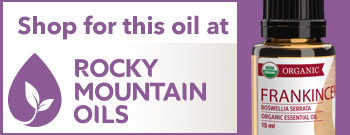Frankincense Essential Oil
Boswellia Carteri or Boswellia Serrata
Frankincense Essential Oil blends well with Lime, Lemon, Orange and other Citrus oils as well as Benzoin, Bergamot, Lavender, Myrrh, Pine and Sandalwood.
Known Uses
Frankincense Essential Oil’s anti-inflammatory properties make it a favorite medicine for asthma, gastroenteritis, and skin conditions.
New research suggests that frankincense’s disease reversing power may be even more impressive than previously suspected, linking it to a potential treatment for brain, breast, colon, pancreatic, prostate, and stomach cancers. Baylor cancer scientists emphasize that Boswellia Serrate may be a viable candidate for both cancer prevention and treatment! A 2012 study even found that a chemical compound found in frankincense called AKBA is successful at killing cancer cells that have become resistant to chemotherapy.
It’s believed that the Frankincense Oil can influence the nervous system. It helps reduce stress and negative emotions, helps boost immune system function and prevents illness. As an astringent, kills harmful germs and bacteria, heals the skin and prevents signs of aging, balances hormone levels, and eases digestion. It has been shown to be beneficial in reducing symptoms of leaky gut syndrome, chronic colitis, ulcerative colitis, Crohn’s disease, and IBS. It also acts as a sleep aid and helps decrease inflammation and pain.
Frankincense Oil will immediately induce the feeling of peace, relaxation, and satisfaction. It is an antiseptic, meaning it will help eliminate bacteria and viruses from your home and to clean indoor spaces. The plant has been commonly burned to help disinfect an area and is used as a natural deodorizer. Due to its antiseptic properties, it can help prevent tooth decay, bad breath, cavities, and oral infections.
Frankincense Essential Oil is a powerful astringent, helping to protect skin cells. It can reduce acne blemishes, the appearance of large pores, prevent wrinkles, and it will lift and tighten skin to naturally slow signs of aging. The oil can be used anywhere where the skin becomes saggy such as the abdomen, jowls, or under the eyes. It may decrease the appearance of scars and help reduce the appearance of dark spots caused from acne, stretch marks, eczema and help with healing of surgical wounds.
Frankincense Oil can help relieve gastrointestinal discomfort, gas, constipation, stomach aches, irritable bowel syndrome, PMS, or cramps, It helps speed up the digestion of food, similar to digestive enzymes. It can provide relief from coughing and help eliminate phlegm in the lungs. It also acts as an anti-inflammatory in the nasal passages, making breathing easier, even for those with allergies or asthma. Frankincense Oil can improve circulation and reduce joint and muscle pain associated with arthritis, digestive disorders, and asthma.
History
The word frankincense comes from the term “franc encens,” which means quality incense in old French. Frankincense Essential Oil has been associated with many different religions over the years, especially the Christian religion, as it was one of the first gifts given to Jesus by the wise men.
Warnings
There are no known adverse side effects. That being said, frankincense essential oil should not be used during pregnancy, since it acts to increase menstrual flow. It should not be ingested in large quantities, as it can be toxic. Frankincense Essential Oil is extremely well tolerated, especially compared to prescription medications. Rarely frankincense oil can cause minor skin rashes and digestive problems like nausea or stomach pains. Frankincense is also known to have blood-thinning effects, so anyone who has problems related to blood clotting should not use Frankincense Oil as the oil may have potential to negatively react with certain anticoagulant medications.


